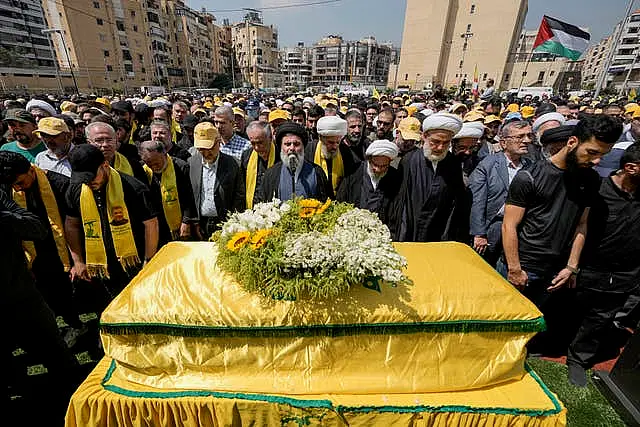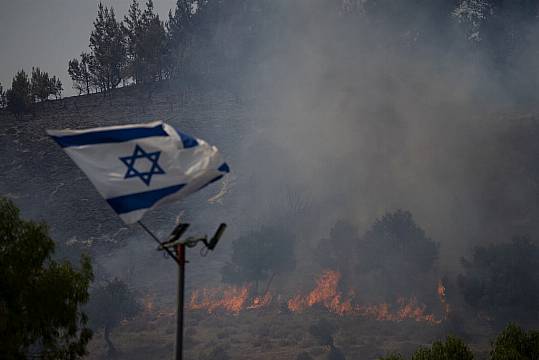Lebanese militant group Hezbollah says its intensified attacks along Israel’s northern border this week demonstrate to Israeli leaders that an all-out war would be costly, senior official Sheikh Ali Daamoush said in a sermon during Friday prayers.
Iran-backed Hezbollah militants launched dozens of rockets on Friday in a third day of retaliation for the killing of senior commander Taleb Sami Abdullah, 55. The Israeli military said approximately 35 projectiles were identified.
Cross-border attacks by Israel and Hezbollah have been taking place almost daily since the war in Gaza began in October.

The escalation comes as some Israeli leaders have threatened all-out war to silence Hezbollah’s rocket fire, and as the militant group seeks to pressure Israel during the ceasefire negotiations in support of its Palestinian ally Hamas.
US President Joe Biden said on Thursday he does not expect to seal a Gaza ceasefire deal in the near future, as an American-backed proposal with global support has not been fully embraced by Israel or Hamas.
Later on Friday it emerged that Israel will not join a trilateral effort to stem fighting with Hezbollah proposed by France’s president, Israel’s defense minister said Friday.
“As we fight a just war, defending our people, France has adopted hostile policies against Israel,” Israel’s defence minister Yoav Gallant said on Friday in a statement from his office rejecting the French proposal.
French President Emmanuel Macron mentioned the effort on Thursday on the sidelines of the G7 conference in Italy. He said France, the US and Israel had agreed to work jointly towards quelling tensions between Hezbollah and Israel, who have exchanged cross-border fire nearly every day since the war in Gaza began.
“We have agreed on the principle of a trilateral between Israel, the United States, and France to advance the roadmap we have proposed,” said Mr Macron.

Mr Gallant’s rejection of the French proposal was criticised by senior officials in Israel’s Foreign Ministry in a rare public spat.
“We disapprove of minister of defence Gallant’s attacks on France,” the officials wrote on Friday.
They said France had supported Israel in many ways over the course of the war — by assisting Israeli defences against an Iranian missile attack in April, by sanctioning Hamas and Iran, and by fighting antisemitism domestically.
Israel’s war against Hamas in Gaza has killed more than 37,100 people, according to Gaza’s Health Ministry, which does not distinguish between combatants and civilians in its count.
Palestinians are facing widespread hunger because the war has largely cut off the flow of food, medicine and other supplies. UN agencies say over one million in Gaza could experience the highest level of starvation by mid-July.
Around two thirds of all roads in the Gaza Strip have been damaged or destroyed by war, according to the UN satellite centre.
The centre said on Friday that its assessment was based on high-resolution satellite imagery collected on May 29, after almost eight months of fighting between Israel and Hamas.
UNOSAT released a satellite photo of the tiny Palestinian territory overlaid with a color-coded map of the dense road network. It appears to show nearly all of the roads in Gaza City and areas north of Wadi Gaza have been affected by the fighting, as well as most of the roads in the southern city of Khan Younis
Roads were also destroyed in zones running along much of the length of Gaza’s borders with Israel and Egypt.
Israel launched the war after Hamas’s October 7 attack, in which militants stormed into southern Israel, killed some 1,200 people — mostly civilians — and abducted about 250.







